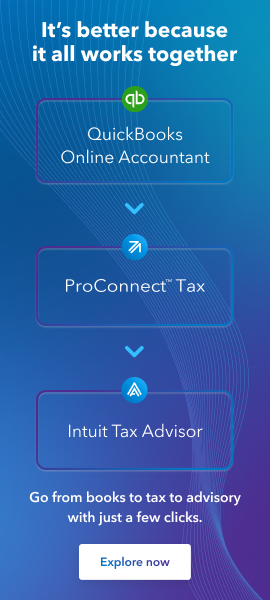- Topics
- Training
- Community
- Product Help
- Industry Discussions
- User Groups
- Discover
- Resources
- Intuit Accountants Community
- :
- Industry Discussions
- :
- Tax Talk
- :
- Proposed 1099-TellUsEverything
Proposed 1099-TellUsEverything
- Mark Topic as New
- Mark Topic as Read
- Float this Topic for Current User
- Bookmark
- Subscribe
- Printer Friendly Page
- Mark as New
- Bookmark
- Subscribe
- Permalink
- Report Inappropriate Content
The administration released today its proposal for making IRS bigger and better than ever. When you come to Page 19 of 24, there is this “oh, by the way” note:
The new reporting regime would build from the framework of the Form 1099-INT reports that taxpayers already receive from financial institutions when they earn more than $10 in interest from a bank, brokerage, or other financial institution. Financial institutions would simply report additional data on the financial accounts of these existing information returns. Specifically, the annual return would report gross inflows and outflows on all business and personal accounts from financial institutions, including bank, loan, and investment accounts but carve out exceptions for accounts below a low de minimis gross flow threshold. [A footnote adds: “ The proposal preserves significant flexibility for the Secretary and the IRS to design the new reporting requirements in the way that will be most effective for tax
compliance efforts.”]
My thoughts:
1) That could be good way to catch tax cheats, and discourage others from trying in the first place.
2) It’s really not much of a burden for banks to report total deposits and total withdrawals for the year. And for many IRS audits, that’s the first thing they ask for anyway.
3) But Senator Grassley says this is a “big can of worms.” The worms I see are those that involve giving IRS so much data they don’t know what to do with it. It’s sort of like NSA surveillance of all phone calls.
4) Would we be the first country to do this? Can’t we get Lithuania to try it out for us, first?
https://home.treasury.gov/system/files/136/The-American-Families-Plan-Tax-Compliance-Agenda.pdf
![]() This discussion has been locked.
New comments cannot be posted on this discussion anymore. Start a
new discussion
This discussion has been locked.
New comments cannot be posted on this discussion anymore. Start a
new discussion
- Mark as New
- Bookmark
- Subscribe
- Permalink
- Report Inappropriate Content
1) The tax cheats will go bankless, as many already do.
This will be eye opening for many, but I imagine IRS already has the ability to get this information.
The more I know the more I don’t know.
- Mark as New
- Bookmark
- Subscribe
- Permalink
- Report Inappropriate Content
I'm all for catching the cheaters (since I don't...) but I can see issues similar to F 1099-K reporting. Not everything deposited in an account is income. IF the IRS "assumes" cash flow equals reportable income and taxpayers are required to prove them wrong.... oy.
- Mark as New
- Bookmark
- Subscribe
- Permalink
- Report Inappropriate Content
@abctax55 "IF the IRS "assumes" cash flow equals reportable income and taxpayers are required to prove them wrong.... oy.
That's exactly what they do in many business audits.
@sjrcpa "The tax cheats will go bankless, as many already do."
Those that are dealing only with cash are a small part of the problem. It's those who are selling goods or services to people who want to use plastic or checks that this is intended to discourage.
- Mark as New
- Bookmark
- Subscribe
- Permalink
- Report Inappropriate Content
@BobKamman I've been doing this long enough to know how audits work. Not everyone gets audited. This *potentially* opens up that can of worms if the IRS is provided info showing gross receipts (i.e deposits reported by the bank) that is more than reported as income on Sch C (for example). Will they now automatically send a mismatch notice?
- Mark as New
- Bookmark
- Subscribe
- Permalink
- Report Inappropriate Content
I don't think their first priority is Schedule C filers. As the report states:
More than 4.2 million partnership returns were filed in calendar year 2018, which is more than double the number of corporate returns filed the same year; however, the IRS audited only 140 of these returns.
Edited to add: Similarly, just 397 of the 4.8 million S-corporation returns were audited.
With enough money IRS could come up with algorithms that have a high likelihood of identifying unreported income. I have misgivings about this proposal also, but what are the alternatives? Require taxpayers to self-report annual deposits?
- Mark as New
- Bookmark
- Subscribe
- Permalink
- Report Inappropriate Content
That should make the new tax returns simple:
Total deposits
minus total withdrawals
less loan proceeds
plus loan principal payments
plus/minus other nontaxable items (need to describe)
equals taxable income.
We should be able to have those new forms knocked off in a matter of minutes.
Slava Ukraini!
- Mark as New
- Bookmark
- Subscribe
- Permalink
- Report Inappropriate Content
That's just the first step. Then you have to compare the total deposits (source) to the total known expenses (application). If the bank deposits are $50,000 but the mortgage is $4,800 a month, then use Schedule WTF to list how the taxpayer managed to eat and pay the utilities.

